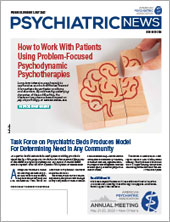The American Association of Directors of Psychiatric Residency Training (AADPRT) is urging general psychiatry training programs to interview candidates for residency slots virtually—rather than in person—for the 2022-2023 recruitment season beginning in October. The recommendation does not apply to fellowship programs.
The recommendation, released by AADPRT in early May, is driven primarily not by the COVID-19 pandemic but by the convenience and cost savings afforded by virtual technology and by applicant preference, said AADPRT President Sallie De Golia, M.D., M.P.H.
She cited an April paper in the Journal of Graduate Medical Education that reported the results of a survey of 1,429 candidates applying in a range of specialties, including psychiatry. Of the 565 respondents, between 83% and 96% considered virtual interviewing for establishing comfort and connection, demonstrating applicant strengths, and answering applicant questions.
The majority of respondents (84%) were in favor of keeping a component of virtual interviews. Given a list of characteristics of virtual interviews, respondents selected advantages to virtual interviews more frequently than disadvantages; commonly selected advantages included cost savings, time efficiency, reduced burden of travel, and reduced carbon footprint.
A concern for equity—making interviewing easier for candidates who lack the resources to travel to multiple institutions—has also made virtual technology preferable. Some medical students have taken out thousands of dollars in loans just to finance travel to residency interviews.
“Virtual interviewing has increased our ability to interview a more diverse group of candidates,” De Golia said. Anna Kerlek, M.D., chair of the AADPRT Committee on Recruitment, noted that training programs have also benefitted from decreased costs associated with virtual technology. “With the pandemic, budgets at many hospitals were dramatically upended, depending on what city or region they were in and whether the hospital was big or small,” she told Psychiatric News. At some institutions, budgets were cut to the point where there was concern that they would not be able to compete for residents in terms of offering dinners and other kinds of attractions that better-resourced programs could offer, she said.
In-Person ‘Second Looks’ Not Mandatory
According to the AADPRT recommendations, training programs can offer in-person “second looks” for candidates who have already interviewed virtually—but the recommendations are explicit in emphasizing that these are not second interviews and that attendance by candidates is entirely voluntary and should not be a factor in whether a program chooses to rank a candidate. The recommendations state: “To avoid pressuring applicants who might feel the need to demonstrate interest by visiting programs in person, we strongly recommend attendance not be taken and that the Residency Selection Committee be blinded to these visits by not informing/reminding the committee if an applicant visited.”
De Golia said this component of the recommendation will need to be reviewed after its trial this year. “We do not want to create a situation where applicants feel they need to show up for the in-person portion in order to demonstrate interest. This would undermine our intent of creating an equitable recruitment environment.”
Kerlek explained that voluntary “second looks” offered by an institution—which were common prior to the pandemic—most typically take the form of group tours or meet-and-greet events with residents. She said feedback from residents has revealed that even during the last two years of the pandemic, many applicants were flying to multiple cities anyway to scope out the living environment, even if they weren’t allowed to formally visit the institution or hospital.
“We are trying to stake out a middle ground,” she told Psychiatric News. “We want to communicate that we don’t expect [candidates to travel to institutions to which they have applied], and it’s not a part of the selection process. Hopefully applicants understand that they can whittle [attendance at a ‘second look’] down to two or three programs that are their top choices.”
No Perfect Way for Screening Is something lost in a virtual interview?
“I think everyone agrees something is,” Kerlek said. “You connect with people in a certain way when you are in the same room [and that is lost in a virtual interview]. But what’s interesting is that based on informal conversations, program directors—including myself—still think we are recruiting great people into our programs.”
She added, “The other thing we know is that there is no perfect way to interview and screen applicants. A consistent finding is that very often your chief resident or top performing resident by [the end of training] is one who might have been ranked very low as a candidate by the institution and barely made it into the residency.”
Art Walaszek, M.D., vice chair for education and faculty development at the University of Wisconsin, echoed that and said the same uncertainty—even in the era of in-person interviews—existed for candidates assessing the residency program. “Does a candidate really know what he or she is getting into? You spend a day there—how much can you tell in a day? It’s a highly curated experience,” he said. “The residency is putting its happiest residents in front of the candidate, buying a nice dinner. Is that really a fair representation of the program?
“Is in-person better than virtual? Sure, you get a better sense of the physical space, what the hospital looks like, where people live in that city, and what the commute is like. You can replace some of that with virtual, but it’s hard. Still, I don’t know that virtual is dramatically worse than in person because either way you don’t really know what you’re getting for sure.”
The pandemic is not the only factor that has changed the way residents and training programs choose each other. Kerlek noted that in recent years the popularity of psychiatry has skyrocketed, with medical students applying on average to more than 50 programs—an astonishing number compared with even 10 years ago, making the choice of a residency a more complex endeavor.
“Psychiatry has gotten extremely competitive,” De Golia said. “We are recruiting an amazing group of students. But applying to 50 programs is over the top and too expensive.”
She said medical school deans and advisors are often urging students to apply to as many programs as possible. But she said that medical students should focus more closely on the dozen or so programs that match their values and what they are looking for.
A number of online resources are available to guide candidates through the process. APA’s “Roadmap to Psychiatric Residency” offers comprehensive advice for medical students preparing to apply for residency. The Association of American Medical Colleges (AAMC) offers “Virtual Interview Tips for Medical School Applicants.”
The AAMC’s “Interview Guidance for the 2022-2023 Residency Cycle” notes that both in-person and virtual interviews require more study and evidence upon which long-term decisions can be made for the ultimate benefit of both learners and program directors. AAMC said it is “prepared to lead a research agenda that would encourage continuous process improvement to help support future decision making in this realm.” ■

